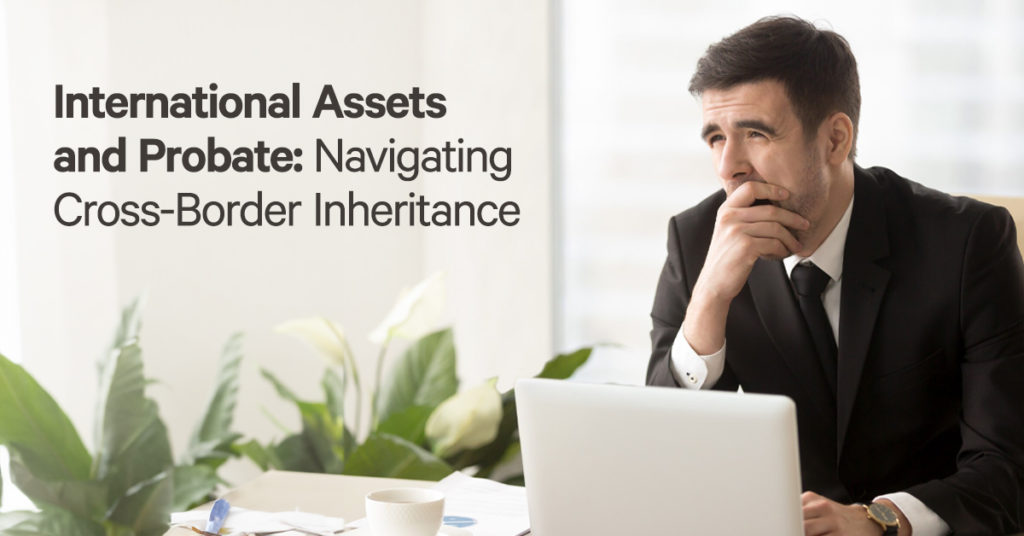
It can be a stressful time when a loved one passes away, not only because of their actual passing but because their estate needs to be distributed to the necessary recipients. When doing this, an estate needs to go through the probate process, which is becoming ever more confusing as more and more people now own assets in various countries.
What Is Probate?
Throughout England and Wales, the word probate is usually used in order to describe both the legal and financial process which is involved in dealing with property, possessions and money of the person who has passed away. The probate process is necessary in order to prove that a will is valid and also to confirm who has the authority to administer the estate of the individual who has died. Prior to the next of kin or the executor who is named in the will be able to claim, transfer, sell or distribute assets, they will likely need to apply for a grant of probate, which is a legal document that is needed to access bank accounts.
Having Assets in Multiple Countries
It is becoming a lot more common for people to own assets in various countries because a lot of people own holiday homes and also have shared bank accounts, shares and other investments overseas. As such, when a person dies and they own assets in multiple different countries, it can be very difficult for the executors and the lawyers to know exactly how they should go about dealing with it. As cross-border inheritance and taxation issues have to be taken into account, foreign estate administration is hard work and can be incredibly complicated.
How Do You Deal with the Estate of Someone Who Had Assets Overseas?
When it comes to dealing with foreign estate administration, you are likely going to need to consider enlisting the help of an expert in probate who has experience working with cross-border administrations. When a person dies who owns assets in multiple countries, the document that was previously mentioned – a grant of probate – will be required for each of the countries the assets were owned. Of course, it may not be called a grant of probate in other countries, but its equivalent will be needed. This process is going to vary from country to country and the steps which need to be taken in order to acquire the necessary documents are also going to vary, which means they could be more complicated.
For instance, say you have an individual who has passed away that owned assets in both England and Spain, If this is the case then it will be necessary to go through separate procedures to release the necessary assets. The probate process in Spain means that the beneficiaries of the Spanish estate are going to have to arrange for a Spanish Deed of Inheritance to be prepared and then filed with a Spanish Notary before the estate is released to the relevant beneficiaries. Then on the English end, a separate procedure is going to need to be followed to obtain a Grant of Probate so that the English assets can be released to the relevant people.
This varies depending on the countries involved though. For instance, if assets are in New Zealand and England then it usually will not be necessary to go through the whole probate process in each jurisdiction. This is because the Colonial Probate Act means if a grant is obtained in New Zealand then that same grant can be ‘re-sealed’ in both England and Wales. This applies to a number of countries including Australia, Canada, New Zealand, Singapore, South Africa, Hong Kong, Malaysia and Jamaica.
Why Is Dealing with Assets in Multiple Countries So Difficult?
When someone passes away and they have assets in multiple countries, it is likely going to be the case that more than one of those countries’ laws apply to the estate. It is also likely going to be the case that more than one of those countries Will’s could apply to the estate as well. The different laws in different countries can more often than not contradict one another and also contradict different parts of the estate.
A good example of such contradictions can be seen in the likes of Spain, Italy and Germany, all of which are common countries for people in England and Wales to have other assets. These are different because they do not recognise the concept of having a personal representative. So, contrary to England and Wales where an executor will need to be appointed, this will not be recognised in Spain, Italy and Germany.
For every country that the deceased owned assets, the different concepts, laws and inheritance tax rules are going to need to be applied in relation to every country that is involved.
What If You Are the Executor of an Estate with Assets in Multiple Countries?
If you have been appointed as the executor of an estate for a deceased loved one who had assets abroad then you should be sure to take advice from probate experts who will be able to let you know if additional documentation is required and if so, what steps you need to take in order to obtain that documentation. Be sure to act quickly when trying to find an expert as there are many out there and you are going to want to work with someone who is right for you.
Do You Need Help with the Probate Process?
If you need help with the probate process then you should be sure to reach out to experts at Probate Online. Our team will be able to sit down with you and provide any advice that you might need when it comes to learning more about the probate process and understanding what to do if the deceased had multiple assets in various countries. If you require any further information or have any questions then please do not hesitate to get in touch.
